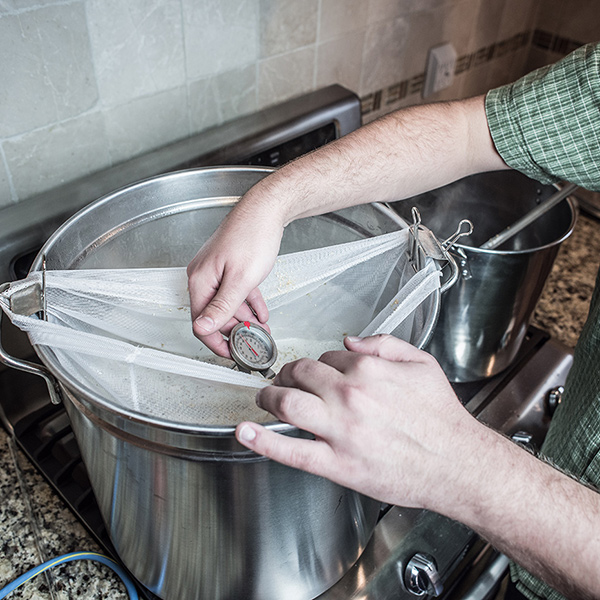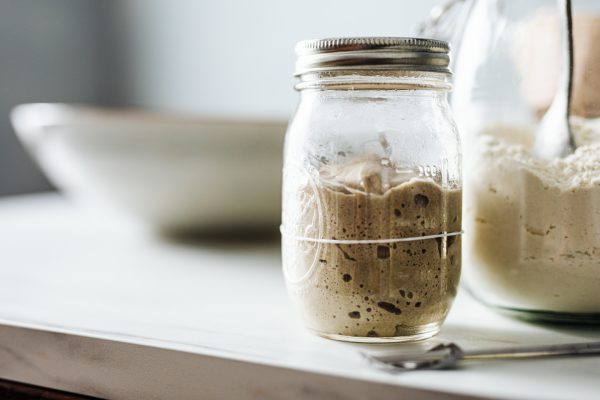
Brew in a bag (BIAB) continues to grow in popularity as a cheaper and simplified way to pursue all-grain brewing. Here are five benefits of BIAB when moving to the mash.
1. Minimal Investment
Jumping into all-grain brewing can be daunting, not only because of the additional procedures that must be grasped, but the perceived cost of acquiring a mash tun and sparge pot. Sure, a mash tun can easily be built for a relatively low price, but it still isn’t as cheap as simply buying a large grain bag.
Full-boil extract and partial mash brewers only need to buy a grain bag large enough for their recipes. Newbies looking to jump straight to all-grain just need a large boil pot and grain bag, which is more or less the same as when pursuing full-boil extract with specialty grain batches.
2. Simplified Procedures
 While you must pay careful attention to mash rest temperatures and duration, the all-grain process is actually simplified when doing BIAB.
While you must pay careful attention to mash rest temperatures and duration, the all-grain process is actually simplified when doing BIAB.
Traditional steps like the vorlauf, latuering and sparging are basically skipped, though the same results achieved as if mashing and lautering in a tun.
With no-sparge BIAB, simply mash in enough water to leave you with your desired pre-boil gravity, remove the grains and let them drip dry, and carry on with the boil as usual.
3. Small Footprint
All-grain brewing with traditional mashing equipment can make for a cramped brew day, especially if you are strictly an indoor brewer. When doing no-sparge BIAB, all you have is one pot. That’s it—no mash tun or pots in addition to the boil kettle. Heck, you could probably get two mashes going with all of that extra space!
And when you’re done, throw the cleaned and dried grain bag into your boil kettle and stick it in storage. This takes up considerably less space than a mash tun and multiple pots. If you are an apartment brewer, you will appreciate how much space this actually saves.
4. Quick Cleanup
 Let’s face it, as homebrewers, we spend quite a bit of time cleaning and sanitizing (and cleaning some more).
Let’s face it, as homebrewers, we spend quite a bit of time cleaning and sanitizing (and cleaning some more).
When brewing all-grain with BIAB, less equipment means less things to clean at the end of the brew day.
On top of that, simply pull the bag of grains out, dump them on your compost pile, and give the bag a rinse to clean your “mash tun.”
If you’re feeling particularly unmotivated, throw your grain bag in with your next load of laundry (but avoid the scented detergents)!
5. Highly Adaptable
While the previous points all assume a single-vessel, no-sparge brew in a bag process, BIAB is actually highly adaptable depending on one’s goals as a homebrewer. If you shutter at the idea of no-sparge, mash in with the standard 1-2 quarts of strike water per pound of grain and account for the rest of the pre-boil gravity with sparge water!
This sparge step can also be particularly beneficial to those who want to do BIAB but don’t have a pot large enough to fit no-sparge volumes. BIAB also lends itself to step mashes since it takes place in a vessel that can withstand direct heating, as well as allowing for a high degree in flexibility with final batch volumes.
For more information on brew in a bag, access the Brew in a Bag Step-By-Step Tutorial, download How-To: Brew in a Bag (BIAB), and print out the Brew in a Bag Note Sheet. For information on extract, partial mash, and all-grain brewing, visit the Resources section of Let’s Brew.


Share Post